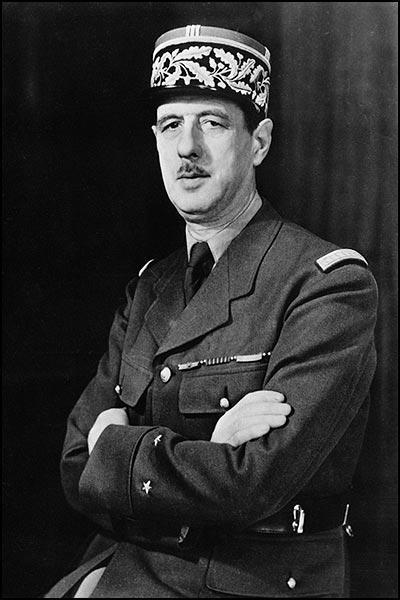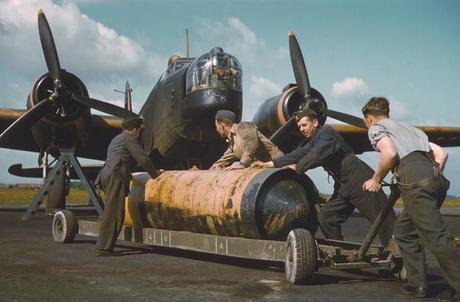posted by author Charles McCain www.charlesmccain.com
 WWII French General Charles De Gaulle A WWII photo portrait of General Charles de Gaulle of the Free French Forces and first president of the Fifth Republic serving from 1959 to 1969.
WWII French General Charles De Gaulle A WWII photo portrait of General Charles de Gaulle of the Free French Forces and first president of the Fifth Republic serving from 1959 to 1969.
Office of War Information, Overseas Picture Division.
[1] The image prefix (LC-USW3) at the Library of Congress image page matches that of pictures from the OWI collection. This image is available from the United States Library of Congress's Prints and Photographs division under the digital ID cph.3b42159.I have put this detailed photo information in because I came across this photo (before I went directly to the Library of Congress) on a website called Maritime Quest. These people constantly slap their copyright on photographs which are in the public domain. It is outrageous that they do this and it is simply a way to get their website mentioned. Any photograph which is released to the public taken by a photographer working for the US Government is immediately in the public domain and no one can copyright one of said photographs.

(photo courtesy of the BBC)
more information on this bomber here:
http://www.haynes.co.uk/wellington/details.htmPrior to D-Day, the Allies wanted to bomb and keep bombing important French rail junctions to make movement on the railroads difficult for the Germans. Since railroad tracks are easy to repair, we had to keep bombing them over many months and bomb rail junctions all over France so as not to give away that we were going to invade in Normandy.
The Allies sought the permission of the Free French under de Gaulle to bomb these rail junctions knowing that many thousands of Frenchmen would be killed. Nonetheless, de Gaulle gave his permission. We bombed to many areas in France that it is hard to say exactly how many French civilians were killed in Allied bombing raids on just rail junctions.
I think the estimate which many historians use is 15,000 to 20,000 dead. Many more French civilians were killed in Allied bombings of German military installations in German occupied France. Nonetheless, the bombing of rail junctions was critical to the success of D-Day. It is worth noting that according to Anthony Beevor's history of D-Day, more French civilians were killed by Allied friendly fire on D-Day than Allied soldiers.
While the efforts of the French Resistance are wildly overestimated, it is worth noting that not one train moved on the French rail network on 6 June 1944.
An excellent piece on the number of French civilians killed in Allied bombing can be found on the BBC website here. A British historian calculates 57,000 French civilians were killed by Allied bombing of France in WW Two. He makes some disparging remarks about why we bombed certain French cities which subsequently were quickly taken by Allied troops which they could have done without having the city bombed.
I sincerely doubt the Allied combat soldiers who were in the front line moving into attack after the bombing would agree. Second, we were bombing German strong points in French cities. We weren't bombing the French cities for the hell of it.
Interesting article on this subject from the BBC here:
It has been a taboo subject in France for 70 years but in his D-Day commemoration speech on 6 June, President Francois Hollande will pay tribute to the terrible civilian casualties suffered by the French due to Allied bombing up to and during the liberation of France. Historians believe Allied bombardments killed almost as many French people as German bombs killed Britons during the Blitz. http://www.bbc.com/news/world-europe-27703724 http://charlesmccain.com/2014/11/bombing-french-rail-junctions/
Author Bio: My first novel, An Honorable German, about a heroic and conflicted German U-Boat Commander, was published in May 2009 right after I survived a bout with lymphoma. Through the Grace of God and the brilliance of Dr. Wydham Wilson, PhD, MD and his deputy genius, Kieron Dunleavy, MD, of the lymphoma team of the National Cancer Institute, I was cured and have spent the time since recovering and working on both my blog and future works.
